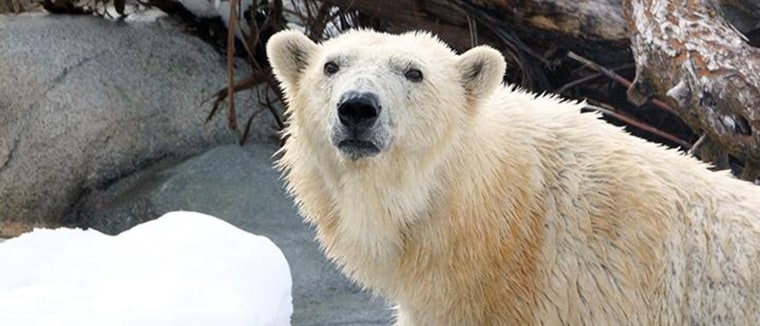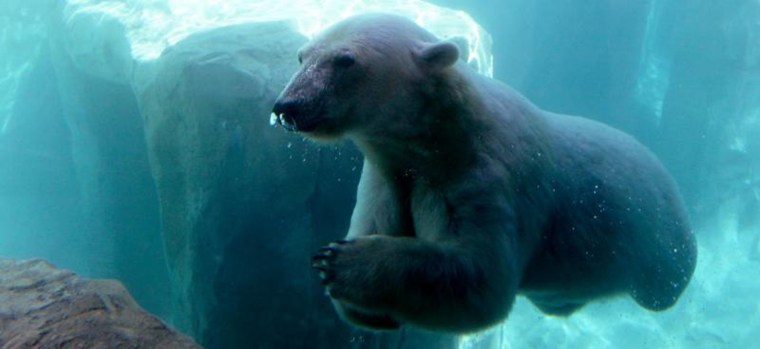The lone polar bear at Utah's Hogle Zoo — a beloved 19-year-old female that zoo staffers called an "ambassador to climate change" — died Saturday after being diagnosed with kidney failure last week.
Rizzo, who lived at the Salt Lake City-based zoo for nearly five years, was euthanized after veterinarians realized there was not much more they could do.
"These decisions are not taken lightly at the zoo. As soon as she wasn't keeping any foods down, that's when [we] made that difficult decision," Erica Hansen, a spokeswoman for the zoo, told NBC News. "Renal failure cannot be cured. All you can hope to do at that point is keep the animal comfortable."

Rizzo had become lethargic and was having trouble eating before zoo veterinarians began running medical tests. They drew blood, performed an abdominal ultrasound and conducted an endoscopic exam of the bear's upper gastrointestinal tract — procedures that led to the diagnosis of renal failure, a condition not uncommon among polar bears.
Vets treated the bear with anti-inflammatories and flushed her system with fluids. But soon they saw Rizzo could not be saved.
Since her death, the zoo's social media pages have been flooded with sympathetic messages and photos.
"Some of those experiences are really going to leave a hole in the community," Hansen said.

One visitor, Lisa Duckworth, took to the zoo's Facebook page to describe her trips to Rizzo's exhibit after leaving doctor appointments to treat her breast cancer.
"There was something about her carefree and fun way that made us feel better," Ducksworth wrote. "While the doctors helped heal my body, Rizzo helped heal our souls. Thank you Rizzo. You will live forever in our hearts."
Rizzo came to the zoo in 2012 as part of its new Rocky Shores exhibit, which was introduced after the zoo took a nine-year hiatus from housing polar bears. To the zoo, she was a symbol of the importance of conservation. Conservation groups worry the species, which faces threats to its sea ice habitat in the Arctic due to climate change, could go extinct by 2100 if not action is taken.
The zoo chose polar bears as one of its "big six" conservative species, meaning extra time and resources were devoted toward preserving their habitats, Hansen said.
"The zoo and these animals are wonderful ambassadors to help educate people on what's going on with their counterparts in the wild," Hansen said. "We'd probably consider it a failed zoo trip if you didn't leave with some nugget of 'Yikes, I need to stop idling my car.' Those little messages matter to us."
This past week, the zoo celebrated "Polar Bear Whiteout Day," offering discounted admission to visitors who wear white and listen to talks about the conservation status of polar bears.
"That's one of the reasons Rizzo was such a treasure — because she was this beautiful ambassador for her species," Hansen said.
And while there won't be another Rizzo, Hansen said Hogle Zoo will coordinate with the Association of Zoos and Aquariums to work on housing another polar bear.